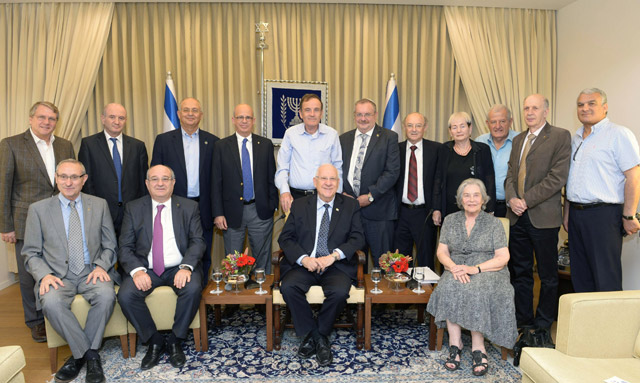(Communicated by the President's Spokesperson)
Israeli researchers are not being advanced in rank, and there is a significant decline in collaboration of scientific studies with international companies who fear their products will be boycotted. There are articles that are not accepted into academic journals and there is huge pressure from student organizations on world leaders to boycott the Israeli academia. These are some of the implications presented Thursday morning (May 28) by university leaders to President Rivlin, during a special discussion which took place at the President's Residence, in light of the growing academic boycott spreading around the world.
During the meeting President Rivlin said, "Recently, I have met with many international leaders and expressed my concern over the way the free world talks about academic freedom, and yet at the same time mixes politics with academia. I never thought there would ever be an actual threat to Israeli academia, but the winds are changing and we must regard this matter as one of the top strategic threats."
Prof. Peretz Lavie, Chairman of the Association of University Heads told the President, "It is still possible to stop the snowball, but we now heading toward the 11th hour. We must mobilize and stop this process in Europe and in the United States. Anti-Israel student organizations were very few in the past, but today they can be found in all the leading universities. We turn to you today in order to place the issue on the public agenda ".
Prof. Ruth Arnon, President of the Academy of Sciences, added, "We cannot ignore the fact that the BDS movement creates a lot of publicity for the boycott, it is a well-funded movement which is very active in many universities, and works actively to delegitimize Israel and Israeli academia in particular. In practical terms we have yet to see the effects of the boycott, but we will certainly see them in the future."
Professor Menachem Ben-Sasson, President of the Hebrew University of Jerusalem, said to the President, "The boycott is a 'silent' boycott, it has not officially been declared until now, and so we worked significantly behind the scenes in conjunction with the heads of universities around the world, as well as research bodies and other academic institutions. We now seek to expose the movement, and we ask you Mr. President, to raise this issue during your official meetings with world leaders."
At the meeting were representatives of the Council for Higher Education, the Academy of Sciences, representatives from public colleges and representatives from the Ministry of Foreign Affairs.
 Copyright: GPO/Mark Neiman
Copyright: GPO/Mark NeimanUniversity leaders and academics have been working to prevent and contain boycotts, including through activities based on personal relationships and familiarity with the fields of knowledge. Recently the Association of University Heads created a special inter-university forum to address the issue of academic boycotts. The forum collects and analyzes information from scientists and scholars about the discovery of covert and overt boycotts, and is assisted by relevant parties in academia and the State in order to deal with the issue.
During the last two years declarative and official decisions were made by a number of organizations to boycott Israeli academic institutions, including the Association for Middle Eastern Studies, the US Anthropologists' Association, boycotts by the student and faculty associations in Canada as well as in universities in California, by the American Studies Association, America-Asia Studies Association, the teachers' unions of Ireland and other boycott initiatives.
As mentioned, the President expressed his willingness to take part in advancing any initiatives of the
Association of University Heads vis-a-vis world leaders, and said that he raises the issue in all of his meetings with diplomatic leaders around the world.
In response to the main points raised by
the Association of University Heads during the meeting, the President stressed the importance of continued dialogue at international conferences and said, "Academia is the fortress of liberalism and criticism, and we must enable our international colleagues to express different opinions regarding Israeli policy. This is the only way to find a solution and nurture understanding."
The President went on to say, "Standing against an academic boycott is a strategic matter, which I will share with all relevant institutions, both in the international arena and at home. I see the international concern over antisemitism, and I want to make it clear that antisemitism destroys the society it calls home and there is no doubt that the matter of an academic boycott, has elements of this destructive phenomenon."
The President concluded his statement by saying, "I consider myself one of your soldiers in this fight and I will continue to meet with you and discuss this subject in the future."